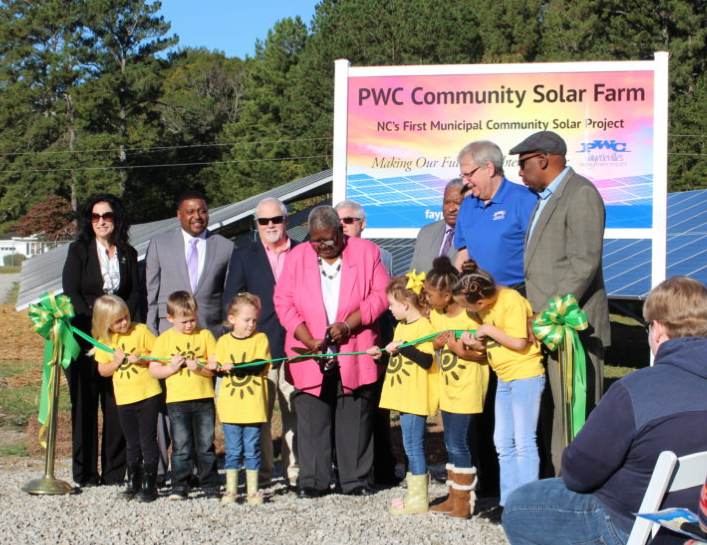NCCETC’s Four-Year Community Solar for the Southeast Project Concludes
The N.C. Clean Energy Technology Center’s Community Solar for the Southeast Project, which began four years ago in 2016, is now wrapping up at the end of the month.
The NCCETC received a grant award from the Solar Energy Technologies Office of the U.S. Department of Energy in 2016. This project, named Community Solar for the Southeast, was created to provide resources and to support the development of community solar programs at electric cooperatives and municipal utilities across the southeastern United States. Rural electric cooperatives and municipal utilities are typically much smaller than investor-owned utilities and often lack the resources to explore and evaluate community solar options by themselves. NCCETC’s role was to design and provide technical analysis of possible projects for these utilities. For the last four years, NCCETC has worked with a number of coops and munis to understand the challenges of developing community solar programs and develop resources that can aid in the development of community solar projects across the region.
The NCCETC team included David Sarkisian, Kimberly Conley, Simon Sandler, and Achyut Shrestha. Other organizational partners included the North Carolina Cooperative Extension, Savannah River National Laboratory, Fayetteville Public Works Commission, Roanoke Electric Cooperative, National Rural Electric Cooperative Association, Electricities, Rocky Mountain Institute, Strata Solar, Geenex and GreenLink. Over the last four years, NCCETC has completed webinars, a workshop, and many technical and policy resources, including a Community Solar for the Southeast Implementation Guide, Community Solar Opportunities for Low to Moderate Income Households in the Southeast, Community Solar Program Design for the Fayetteville Public Works Commission and more. The Center is finishing its final technical assistance project this month, and will also be publishing a case study on the implementation of the Fayetteville Public Works Commission community solar and storage project.

Lessons Learned
Community solar development in electric cooperatives and municipal utilities is still just in its beginning stages. The local decision-making ability and regulatory independence of coops and munis can be leveraged to develop community solar programs that are financially viable and provide benefits to their subscribers and to the utilities themselves.
The successful deployment of the Fayetteville Public Works Commission (PWC) Community Solar Program shows that a community solar program coupled with energy storage could be a financially viable opportunity for similar utilities to consider. However, utilities’ economic situations and wholesale rate structures vary, and careful, utility-specific analysis is necessary to determine whether and how community solar programs can succeed.
“Through this (Community Solar for the Southeast) project, we have learned that cost-effective community solar programs are possible, even in a region with limited policy support,” said David Sarkissian, Policy Analyst. “We hope the resources we have developed can assist other utilities and organizations interested in pursuing community solar programs, both in the Southeast and elsewhere in the U.S.”
The team found that decisions on whether to develop community solar projects ultimately rests on the leadership of these utilities; for rural cooperatives this is the board of directors, while it is the city council for municipal utilities. In the case of Fayetteville, the members of the city council were supportive and actively engaged in the development of their community solar program, which contributed to its successful implementation. Local community members who are advocates for community solar can provide an impetus to local leadership to consider community solar projects. These “local champions” can help spark the interest of other customers and organize an appeal to the city council or board of directors. Since utility leaders are interested in keeping their members satisfied, leadership will often listen to these requests.
What’s Coming Up
The NCCETC is currently partnering with the Cliburn and Associates, LLC, on the Solar Energy Innovation Network (SEIN) Solar-Plus for Electric Co-Ops (SPECs) project, which will help optimize the procurement and operations of battery storage projects at local electric cooperatives. The Center was introduced to Cliburn and Associates through the Community Solar for the Southeast Project.
The NCCETC is also collaborating with the US Department of Energy (DOE)’s National Community Solar Partnership (NCSP), which is a coalition of community solar stakeholders working to expand access to affordable community solar to every American household by 2025.
NCCETC has created numerous resources that are publicly available on the project website for other interested utilities to use. An updated implementation guide and policy landscape document is also planned to be released on the project website near the end of June. Take a look at NCCETC’s Community Solar for the Southeast project website for more.